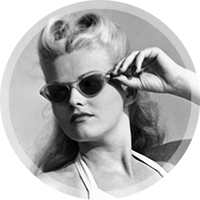

The story of how I discovered film as art is one so patently predictable that it sounds contrived, but it’s in fact the truth: when I was sixteen, I saw Citizen Kane. That’s it. That was all it took for a young, impressionable mind inclined to visual and narrative to realize with the force of revelation that film, rather than simple entertainment to pass time, could be essential, it could be astounding and it could be an expression of people’s ideas, emotions and values just as much as any other work of art.
I’ve gone through varying degrees of involvement with film over the years. I’ve now settled into casual cinephile, although I still believe that at some point in the future I’ll try my hand at filmmaking. My devotion to it as an art form, however, never diminishes, because it’s firmly, deeply rooted in my lifelong fascination with mythology and folklore.
In a modern, fractured, global, business-driven society, mythology is considered antiquated and an artifact of less “sophisticated” cultures. It’s considered unnecessary. Nothing could be further from the truth. Leaving behind, in the name of progress and civilization, the stories we collectively tell and believe makes it that much more difficult for us to connect on common ground, understand how our histories intersect and conceive meaningful futures. By dismissing anything other than cold hard fact as a legitimate tool to build the world around us, we train ourselves to think that our prejudices, assumptions and outright misconceptions aren’t truly real and thus rob ourselves of the ability to deal with them out in the open. As G.K. Chesterson has been paraphrased: “Fairy tales are more than true — not because they tell us dragons exist, but because they tell us dragons can be beaten.” If we deny our shortcomings even exist, we can’t ever grow beyond them.
Mythological art has always made perfect sense to me as a tool for human growth. All humans, from history’s inception, have used it as such. It connects us. It expresses us. It defines us. And in a fast-paced, interconnected, technological world, what better medium for mythology is there than film? Whether we realize it or not, we’ve already developed it as such. It’s already known that one of the biggest American pop cultural cornerstones, Star Wars, was deliberately based on Joseph Campbell’s mythological research. It also explains the success of comic book adaptions. Dig into Hollywood legends. Explore the diversity of modern independent film. These are our stories. This is who we are. If we thought more critically and seriously about film, maybe we could better insure it tells the stories of who we want to be.
In the early 90s, there was a television show called Northern Exposure. It was a quirky dramedy about a NY doctor stuck in a remote Alaskan town with a cast of colorful characters. I adored it. There was a particular episode where young, Native, aspiring filmmaker Ed was charged by the town’s wealthiest member to create a film festival lineup to rival Sundance. He decides to build the festival around the work of Orson Welles. But, as he digs into the legend of the filmmaker who made the masterpiece of Citizen Kane at age 25, Ed becomes more stressed out and depressed about his own work and prospects, and physically ill as a result. Parallel to this storyline is that of Ed’s mentor Leonard (well-known Native actor Graham Greene), a healer and sociologist. Leonard is embarking on a project to discover what stories white people have analogous to the ones his people tell to give meaning to the world around them and their struggles within it. He holds an open call for people’s favorite stories—but all people bring to him are urban legends, told for limited shock or fear value, which confuses and frustrates him. “White people,” he says, “seem intent on making themselves feel worse about the world.” At the close of the episode, Leonard finds Ed in the movie theater, where Ed is watching a print of Citizen Kane to distract himself from his worries and his nervous stomach. It’s the Declaration of Principles scene. Leonard asks why watching the film over and over makes Ed feel better. “It’s beautiful,” Ed replies. “Fearless.” Leonard considers the screen. “Maybe this is it,” he says finally. “What?” asks Ed. “White medicine,” Leonard says. “Movies.” He looks at Ed. “It seems to have cured your stomach.” After another moment of watching Welles and Cotten and Sloane, Leonard points out: “No one in the movie ever finds out what Rosebud means, do they.”
I always delighted in the fact that most of the gods of ancient peoples were hardly paragons of virtue. They often profoundly flawed. They were, in short, human. Their stories taught their followers (and originators) how to live as humans. We take lessons, good and bad, from Charles Foster Kane. And Orson Welles. And every person who searches for the meaning of Rosebud as the key to the truth and never finds it. The journeys are the stories. As we move forward, we should take them with us and try to understand what they really mean about us and our world. Otherwise, someone else will always be writing our meaning for us.